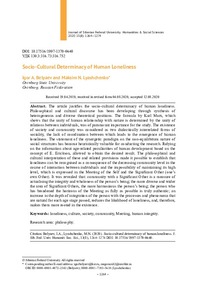Socio-Cultural Determinacy of Human Loneliness
Скачать файл:
URI (для ссылок/цитирований):
https://elib.sfu-kras.ru/handle/2311/135920Автор:
Belyaev, Igor A.
Lyashchenko, Maksim N.
Беляев, И.А.
Лященко, М.Н.
Дата:
2020-08Журнал:
Журнал Сибирского федерального университета. Гуманитарные науки. Journal of Siberian Federal University. Humanities & Social Sciences; 2020 13 (8)Аннотация:
The article justifies the socio-cultural determinacy of human loneliness.
Philosophical and cultural discourse has been developing through synthesis of
heterogeneous and diverse theoretical positions. The formula by Karl Marx, which
shows that the unity of human relationship with nature is determined by the unity of
relations between individuals, was of paramount importance for the study. The existence
of society and community was considered as two dialectically interrelated forms of
sociality, the lack of coordination between which leads to the emergence of human
loneliness. The statement of the synergetic paradigm on the non-equilibrium nature of
social structures has become heuristically valuable for conducting the research. Relying
on the information about age-related peculiarities of human development based on the
concept of E. Erickson, allowed to obtain the desired result. The philosophical and
cultural interpretation of these and related provisions made it possible to establish that
loneliness can be recognised as a consequence of the decreasing community level in the
course of interaction between individuals and the impossibility of maintaining its high
level, which is expressed in the Meeting of the Self and the Significant Other (one’s
own Other). It was revealed that: community with a Significant Other is a measure of
actualising the integrity and wholeness of the person’s being; the more diverse and wider
the area of Significant Others, the more harmonious the person’s being; the person who
has broadened the horizons of the Meeting as fully as possible is truly authentic; an
increase in the depth of integration of the person with the processes and phenomena that
are natural for each age stage passed, reduces the likelihood of loneliness, and, therefore,
makes them more rooted in the existence В статье представлено обоснование социокультурной детерминированности одиночества человека. Философско-культурологический
дискурс развертывался посредством синтеза разнородных и разнохарактерных теоретических
положений. Первостепенно важной для исследования явилась формула К. Маркса,
согласно которой единство отношения человека с природой определяется единством отношений между индивидами. Учитывалось существование общества
и общности как двух диалектически взаимосвязанных форм социальности, отсутствие согласованности между которыми способствует возникновению одиночества человека. Эвристически ценным для проведения изысканий стало положение
синергетической парадигмы о неравновесном характере общественных структур.
Получению искомого результата способствовала опора на информацию о возрастных особенностях развития человека, почерпнутую из концепции Э. Эриксона.
Философско-культурологическая
интерпретация указанных и сопряженных с ними
положений позволила установить, что одиночество допустимо признать следствием
понижения уровня общности во взаимодействии между индивидами и невозможности обеспечить поддержание ее высокого уровня, находящего свое выражение
во Встрече Я и Значимого Другого (своего Другого). Выявлено: общность со Значимым Другим есть мера актуализации целостности и полноты бытия человека; чем
разнообразнее и шире ареал Значимых Других, тем гармоничнее бытие человека;
по-настоящему
полноценен тот человек, который максимально расширил горизонты Встречи; повышение глубины интеграции человека с процессами и явлениями,
естественными для каждой пройденной возрастной стадии, снижает для него вероятность оказаться в одиночестве, а следовательно, крепче укореняет его в бытии

